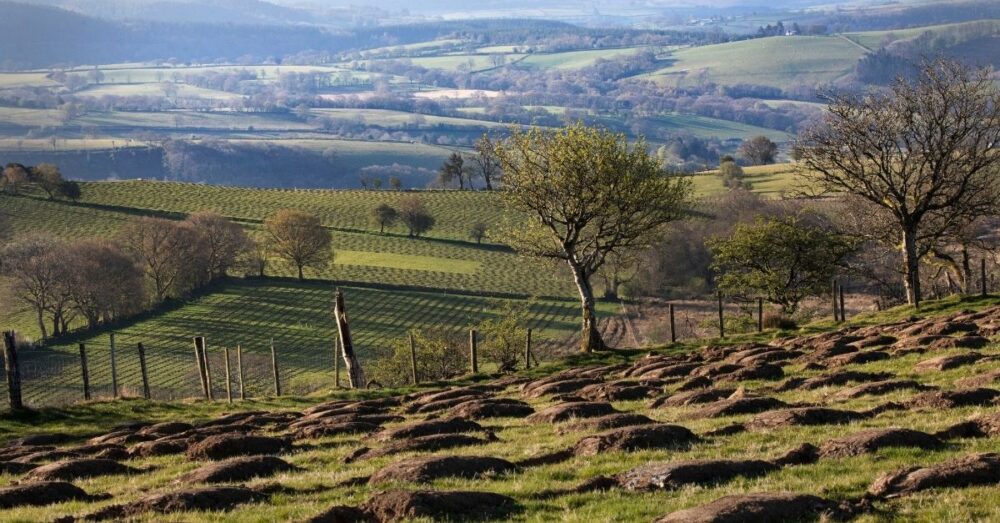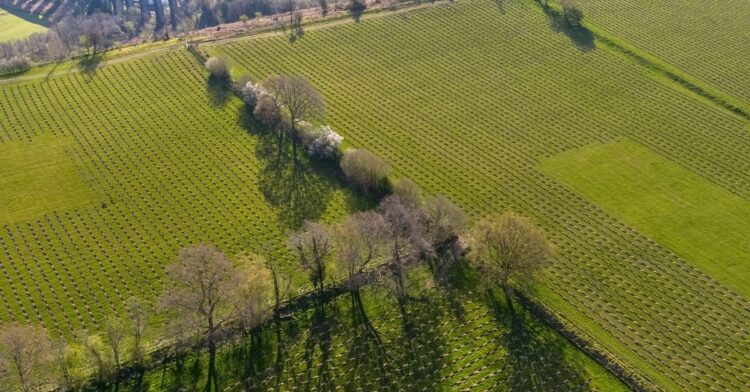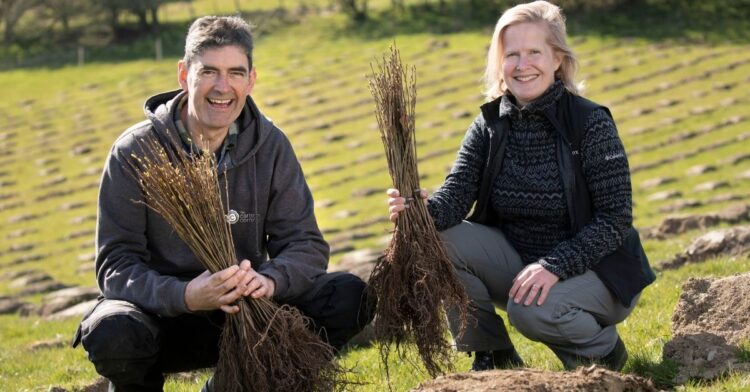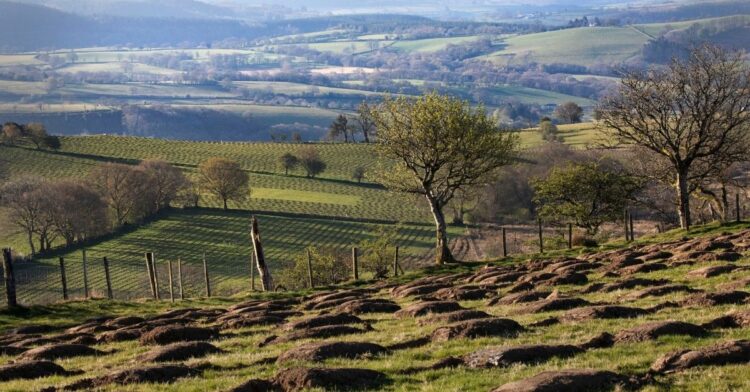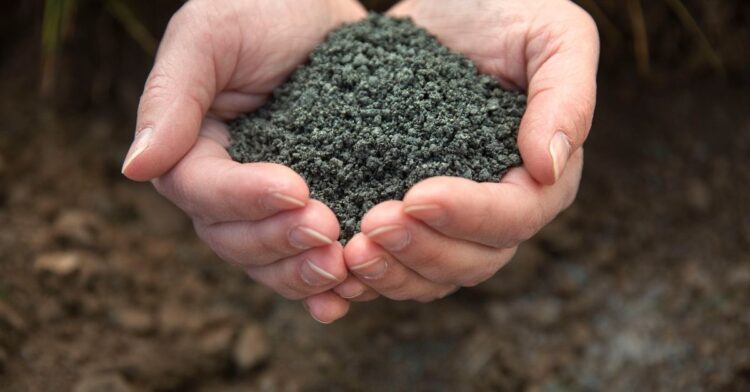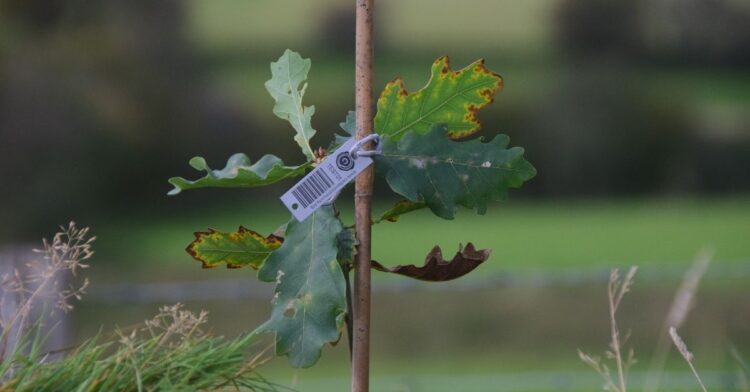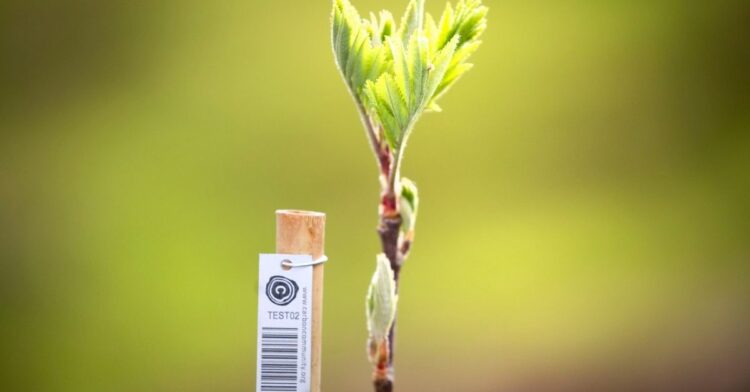This website uses cookies so that we can provide you with the best user experience possible. Cookie information is stored in your browser and performs functions such as recognising you when you return to our website and helping our team to understand which sections of the website you find most interesting and useful.
Tilhill -The Carbon Community Forestry Partner
Starting this month, more than 25,000 new trees will be planted on 11 hectares (28 acres) in Carmarthenshire, near the Brecon Beacons, Wales, in a field trial combining two nature-based climate solutions never previously deployed together at scale. The project will assess the combined effects of forest microbiome inoculation and the deployment of enhanced rock weathering, and their ability to accelerate and enhance forest carbon sequestration in conifer monoculture and mixed broadleaf forests.
Charles Nicholls, co-founder of The Carbon Community, commented: “Reforestation is one of the most powerful tools we have to combat climate breakdown, much of which will happen on agricultural land. Intensively farmed land is often stripped of the native biodiversity and minerals needed for optimal tree establishment. With this unique project we aim to restore biodiversity, enhance tree survival and unlock huge potential to accelerate and enhance the carbon stored in trees and soil.”
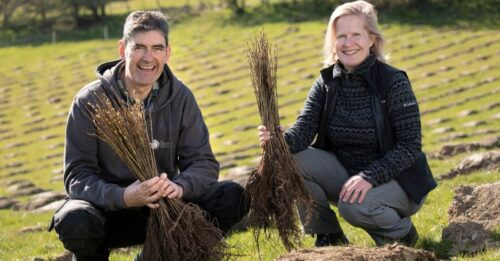
Over the first two years, the project will measure the carbon stored in the trees and soil, and the results will identify the combination of treatments where the most carbon has been sequestered. The Carbon Community aims to scale up this reforestation method to accelerate and enhance carbon removal from the atmosphere.
The Carbon Community field trial is the first of its kind and the results will be made freely available to other tree planting projects and environmental scientists. The 72 test cell trial will study two types of forests: the first is comprised of native broadleaf species from Wales, including Birch, Alder, Cherry, Oak, Aspen and Rowan. The second type is a monoculture conifer forest comprising Sitka Spruce, typical of commercial forestry plantations.
In the design of this experiment ETH Zürich’s Crowther Lab is intentionally reintroducing soil microbial and mycorrhizal communities sourced from established forest ecosystems in an effort to jump start reforestation. For this field trial, The Carbon Community sourced live soils from nearby forest ecosystems, which will be used as microbial inocula at the time of planting.
Colin Averill, Senior Scientist at the Crowther Lab, commented “This is an important world-first field trial which will measure carbon sequestered in trees and soil on a scope and scale not seen before. Studies continue to find that introduction of native soil communities can dramatically increase plant survival. (1)How these fungi may in turn affect tree seedling growth and survival rates and ecosystem carbon sequestration at scale remains unknown, and is one example of how The Carbon Community is pushing the frontiers of nature-based climate solutions.”
Professor David Beerling, University of Sheffield, commented: “Our recent research revealed that applying basalt to croplands could absorb up to 2 billion tonnes of CO2 from the atmosphere. This exciting new partnership with The Carbon Community enables us to understand basalt addition in a reforestation project, including the potential carbon sequestration when co-deployed with forest microbiome restoration. To avoid catastrophic climate change we need to urgently scale-up carbon removal strategies, alongside deep emissions cuts.”
The project builds on recent studies, which continue to find that soil microbiome inoculation with native mycorrhizal fungi from established ecosystems can dramatically increase plant survival(2). Basalt also contains nutrients that stimulates mycorrhizal fungi and can support tree growth(3). Enhanced rock weathering takes crushed basalt, a mining by-product, and applies it to the soil to capture CO2 and provide essential nutrients to fertilize trees. This method, proven in sugarbeet and pea crops, was recently hailed as one of the best near-term ways to remove carbon dioxide from the atmosphere(4).
Tree planting will be high on the agenda at the upcoming UN Biodiversity Summit and COP26, with countries across the world pledging ambitious reforestation targets to tackle the climate crisis and biodiversity decline.
Clare Pillman, Chief Executive of Natural Resources Wales, said “This is a critical time for nature. If we are going to tackle the interconnected nature and climate crises and turn the tide on decades of biodiversity decline, we need to act now to ensure the resilience of our planet’s life support system. We all stand to benefit from committing to nature’s recovery, and woodland creation can play a significant role in long term carbon sequestration for future generations. NRW lends its full support to this exciting initiative as a key component to accelerating our approach to tackling the climate crisis.”
Tilhill - Planting Trees
Sonia Winder, Tilhill Forest Manager, Wales & Marches, said: “After 18 months of planning, preparation, and creative thinking with the Carbon Community, Tilhill is very happy to complete the first phase of this project – planting an experimental woodland of 25,000 conifer and broadleaved forest trees.
Planting and looking after trees is what we do – and what is exciting is finding out whether a forest soil microbiome can be created, and if so, whether it will help the trees to grow, thrive, and sequester more carbon than if they had just been planted onto a grassland site. With a mixture of spruce, alder, birch, cherry, aspen, rowan and oak, we’re planting a mixture of pioneer and climax species – and by adding natural microbial communities, we hope that we might be speeding up a natural process by several hundred years.
We can’t wait to find out what happens to these special trees over the next 5 years, and will be guarding them carefully in the meantime against nibbling rabbits, droughts, frosts, weeds and other things which threaten young trees!”
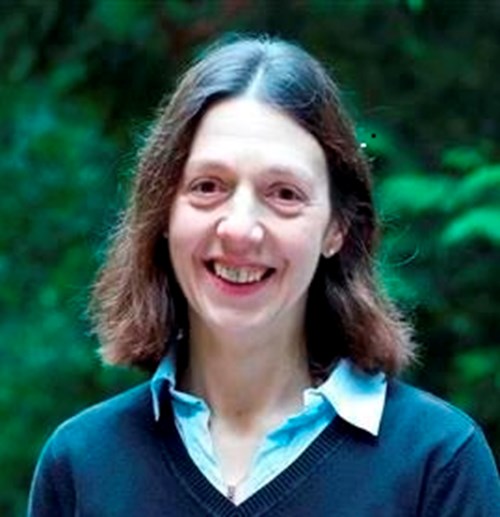
The Carbon Community
The Carbon Community is a new charity dedicated to creating forests and accelerating carbon removal, with breakthrough science. Its planting and restoration projects are designed, in partnership with world leading scientists, to learn more about how to accelerate and enhance carbon sequestration. It is committed to sharing its findings as widely as possible to increase carbon sequestration in its own projects and beyond.
The Carbon Community creates new forest on its own land, to ensure the trees that are planted will be there for generations. The charity is looking for funders and partners to scale up tree planting and help advance the research on carbon in trees and soil.



